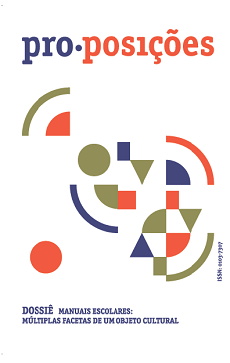Resumen
Este trabajo aborda la cuestión de la identidad del libro escolar como un género textual específico en el contexto de la manualística clásica y moderna, contextualizando los análisis en el marco de la cultura de la escuela tradicional y en la era de la revolución digital y bajo una perspectiva historiográfica y teórica. También plantea el nacimiento y primeros desarrollos de la manualística como campo intelectual y académico y sus contribuciones a la definición de la identidad del libro escolar.
Abstract
This paper discusses the question of identifying a coursebook as a specific text genre in the context of the classical and modern manualistics, situating the analysis within the traditional school culture and the digital revolution era, under a historical and theoretical perspective. It also covers the birth and initial development of manualistics as an intelectual and academic field and its contributions to the definition of the schoolbook identity.
Key words schoolbook, text genre. manualistics. school culture. hypertext. digital era
Citas
APPLE, Michael W. Maestros y textos (Teachers and texts). Barcelona: Paidós, 1989.
ATTALI, J. Chemins de sagesse: traité du labyrinth. Paris: Fayard, 1996.
CHARTIER, Roger. ¿Qué es un texto? In: CHARTIER, Roger. ¿Qué es un texto? Madrid: Círculo de Bellas Artes, 2006.
CHOPPIN, Alain. Manuels scolaires, États et sociétés, XIXe-XXe siècles: introduction.
Históire de l´Éducation, n. 58, Paris, França, mai 1993, p.5-7.
DELEUZE, Gilles. Diferencia y repetición. Madrid: Júcar, 1988.
DEPAEPE, Marc; SIMON, Frank. Is there any place for the history of education in the History of Education? Paedagogica Historica, Gent, XXX-1, 1995.
ECO, Umberto. El libro escolar como maestro. España: El Mundo, p. 4, 2004.
ESCOLANO, Agustín (dir.). Historia ilustrada del libro escolar en España. Madrid: Fundación G.S. Ruipérez, 2 v., 1997-1998.
ESCOLANO, Agustín. Currículum editado y sociedad del conocimiento: texto, multimedialidad y cultura de la escuela. Valencia: Tirant lo Blanch, 2006a.
ESCOLANO, Agustín. La recepción de los modelos de la Escuela Nueva en la manualística escolar española de comienzos del siglo XX. Historia de la Educación, Salamanca, 25, p. 317-340, 2006b.
GAGGI, Sergio. From text to hypertext: decentering the subjetc in fiction. Philadelphia University Press, 1997.
ISSIT, John. Reflections on the study of textbooks. History of Education, v. 33-6, p. 683-696, 2004.
JULIA, Dominique. La culture scolaire comme objet historique. In: NOVOA, A. (ed.). The Colonial Experience in Education. Paedagogica Historica, Gent, Supl. Series. p.356, 1995.
LANDOW, George. Teoría del hipertexto. Barcelona: Paidós, 1997.
LÉVY, Pierre. ¿Qué es lo virtual? Barcelona: Paidós, 1999.
ROSENBERG, Martin. Contingency, liberation and seduction of geometry: hypertext as an avant-garde medium. Open Forum, “El relato digital”, 2004.
SILVER, Harold. Knowing and not knowing in the History of Education. History of Education, n. 21-1, p. 97-108, 1992.
TYACK, David; CUBAN, Larry. En busca de la utopia. México, FCE, 2000
A Proposições utiliza a licença do Creative Commons (CC), preservando assim, a integridade dos artigos em ambiente de acesso aberto.

